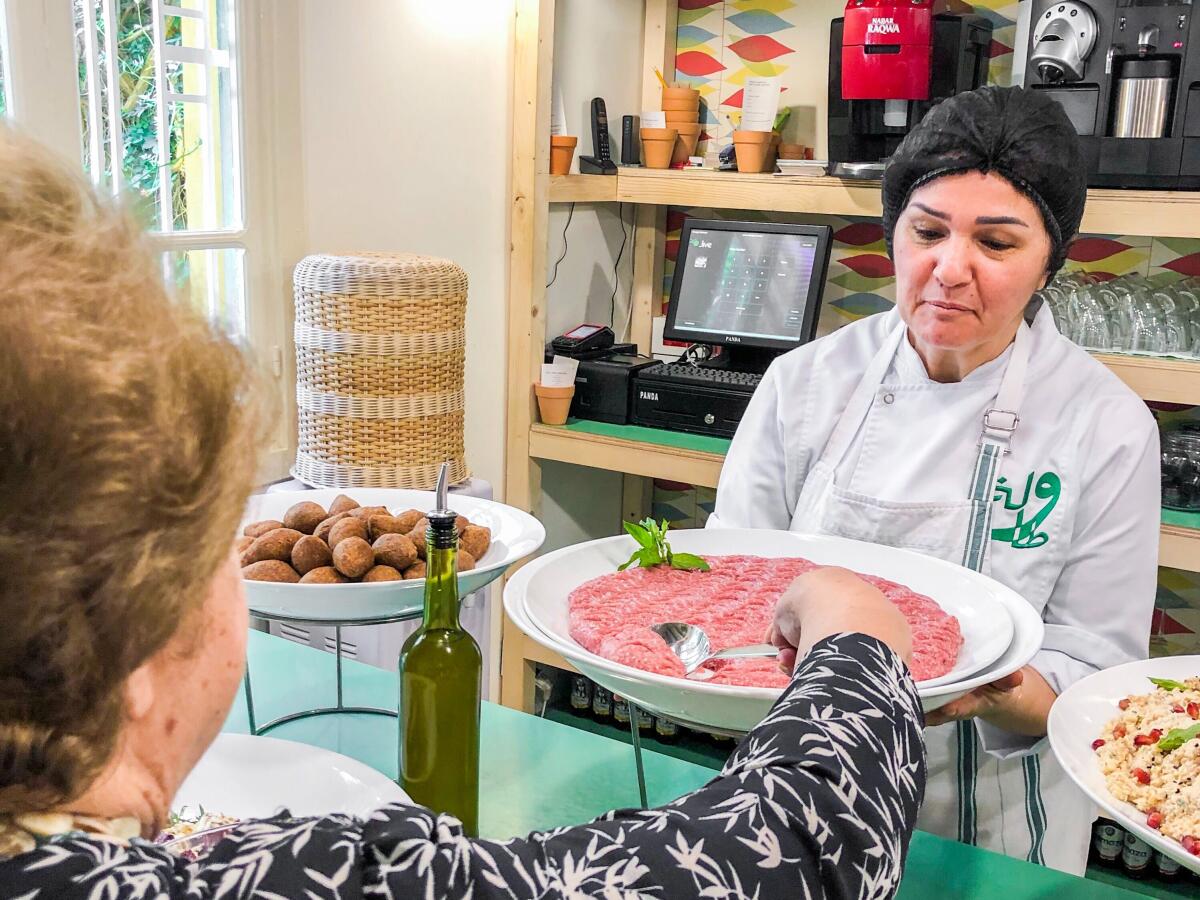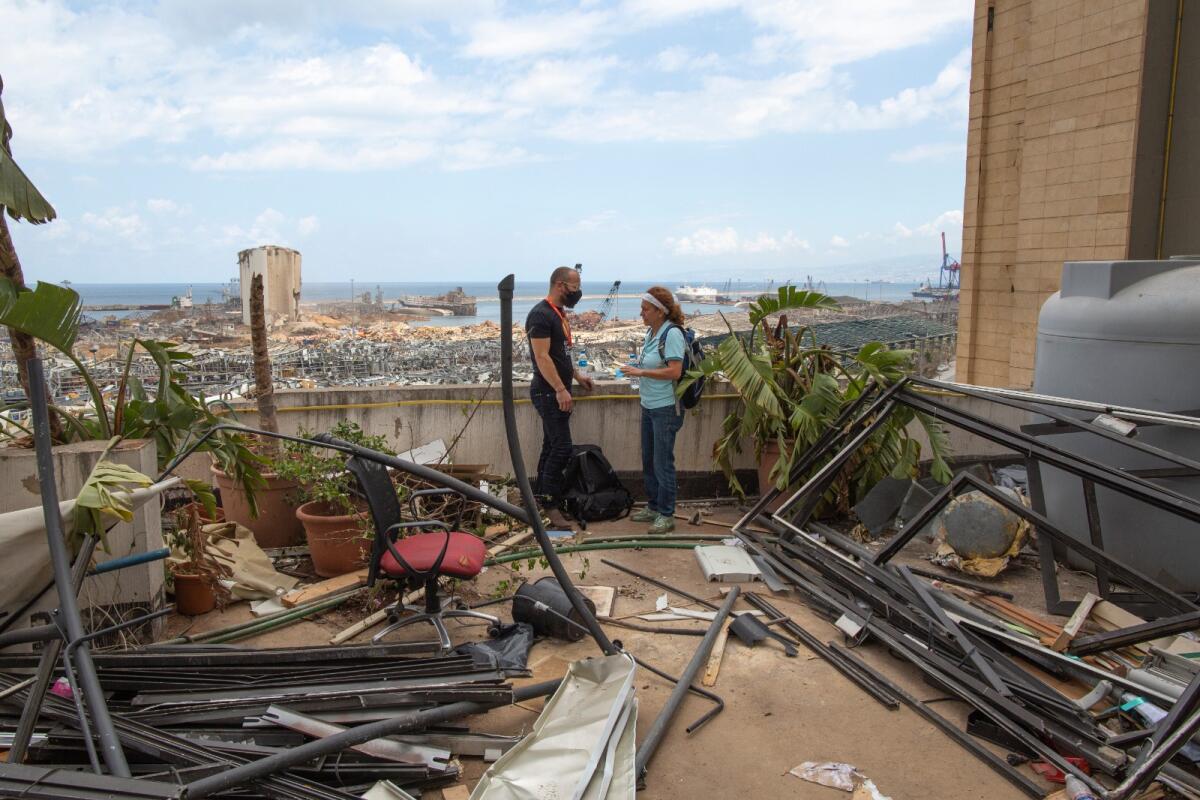José Andrés helps feed Beirut during a time of crisis
- Share via
[Editor’s note: This is an expanded, updated version of a story that first appeared in our weekly Tasting Notes newsletter.]
A year ago in Beirut I was sitting snug among friends and strangers at the communal table at Tawlet, a sun-filled restaurant in Beirut’s dense Mar Mikhael neighborhood. We ate tomato and eggplant salad and kibbeh nayeh, the olive oil-doused lamb tartare that’s a national dish of Lebanon. The restaurant had no set menu: The food came from a network of farmers, and the chefs were often women who cooked the specialties from their villages in the mountains outside Beirut.
Images on social media from the last two weeks show the new reality at Tawlet: The dining area has become an efficient workroom. Cooks and volunteers, their faces obscured by masks, stand bent over the long central table, filling takeout containers to feed people across the city in the wake of the Aug. 4 blasts at the Port of Beirut. The explosion killed nearly 200 people, injured more than 6,000 and displaced 300,000 residents from their homes.
Hot meals — including molokhia, a comforting stew of jute leaves simmered with chicken — often go to the elderly and the displaced. Hummus and grilled vegetables sandwiches find their way to firefighters, hospital workers and other first responders who need quick, handheld sustenance.
Tawlet, owned by prominent Beiruti restaurateur Kamal Mouzawak, is one of nine businesses in the city that has partnered with World Central Kitchen, the nonprofit founded by chef and humanitarian José Andrés. The organization’s efforts are a story of hope among the horror.
Much of the world learned about World Central Kitchen when it gained recognition during its on-the-ground efforts to feed Puerto Ricans following the destruction caused by Hurricane Maria in 2017. (Andrés founded the nonprofit 10 years ago with his wife, Patricia.) In 2020, responding to the COVID-19 crisis, World Central Kitchen provides more than 300,000 meals daily to people in need across the U.S.
The aid extends to Southern California: Andrés and his crew teamed in March with a pilot program called Feed the Frontline to provide meals to Los Angeles hospital workers. In Long Beach, a World Central Kitchen initiative known as Restaurants for the People provides funds for Lola’s Mexican Cuisine, the Ordinarie and Breakfast Bar to prepare meals that feed 3,000 to 6,000 seniors weekly while also creating jobs for restaurant workers.

World Central Kitchen’s response to the Beirut catastrophe was swift. Engineering analysts have called the Aug. 4 detonation, which ignited 2,750 tons of ammonium nitrate stored in the port area, one of the largest non-nuclear explosions in history. Damages total an estimated $10 billion to $15 billion. Sam Bloch, the organization’s director of field operations, left for Lebanon the day after the blasts.
The logistics were daunting. Mouzawak’s partner suffered a head injury and windows blew out in their home. Tawlat (the word means “table” in Arabic) sustained fewer blows than many other businesses in Mar Mikhael, a district known for its restaurants and its late-night bar scene. Still, the neighborhood was a nightmarish landscape of debris, rubble, smashed cars and shattered glass. “It took me two days to even start thinking again,” Mouzawak said, “and then World Central Kitchen contacted me on WhatsApp.” Their combined teams began preparing food for the community three days after the explosions.
“In nine kitchens across Beirut, we’re producing close to 11,000 meals every day,” said Nate Mook, chief executive of World Central Kitchen, who joined Andrés in the city last week. Meals are going to more than 50 locations across the region, including churches to nonprofits such as the Lebanese Food Bank, Lebanese Red Cross and Food Blessed, which focuses on hunger relief.
Food insecurity in Lebanon looks dire. Lebanon imports 85% of its food, according to a statement from the United Nations’ World Food Programme, and the explosion wiped out reserves of grains stored near the port.
“It’s not like I can walk into Walmart or Whole Foods to buy ingredients,” Mouzawak said.
“This is the first time World Central Kitchen has activated in the Middle East, and it’s a new environment for us,” Mook said. “There are a lot of complexities involved that were happening before this catastrophe — a combination of economic disaster, COVID-19 and political unrest.”
In Lebanon, political power is shared among sectarian groups that represent various religious affiliations, and citizens began demonstrating last October against long-standing government corruption and political dysfunction. The explosion at the port — with unanswered questions over why tons of ammonium nitrate, a chemical used for fertilizer and explosives for mining, was stored in the city center — is for many Lebanese citizens a horrific embodiment of the government’s ineptitude.
“I’m furious. I’m outraged. And I’m still in shock. I literally don’t know how I’m living,” said Aline Kamakian. She owns Mayrig, an Armenian-Lebanese restaurant, opened in 2003, that has become an institution in Beirut. Located in the Gemmayze district, it sits across the highway from the decimated port area. The blast tore through the restaurant, and 25 members of the staff were wounded.

Kamakian’s emotions didn’t kick in until the next day when a Catholic organization that had mobilized volunteers to clean debris offered her staff some food.
“I’m a restaurateur in my restaurant and we don’t have anything to eat?” she said. “It was the first time I had tears in my eyes.”
By week’s end, World Central Kitchen had contacted Kamakian. The organization is now paying her cooks to put out 2,600 meals a day. They’re making pastas, salads and sandwiches paired with peaches, plums or apples from orchards in the nearby mountains — whatever affordable provisions the restaurant’s suppliers can bring.
“I’m really happy to have something to do,” Kamakian said. “It’s a kind of therapy, and you’re diminishing the stress of what’s happening in the country. We cleaned the streets without the help of the government. José and his team said to us, ‘We’ve never seen a place where the people show each other so much love.’”
World Central Kitchen plans to be in Beirut for at least several more weeks, according to Mook.
Mouzawak is beginning to plan long-term ways to care for the community. He recalled a recent conversation with a friend who was packing to leave and said, “This is a dead region.” The words galvanized Mouzawak.
“If it’s a dead region, then someone needs to make it alive. Who will do it?” he asked, adding: “Listening to him felt like answering a question for myself. The Lebanese are so tired of being called ‘resilient.’ I feel like, this is it. This is the last time I have the energy to make things better.”
He’s securing a space that was laid waste near the center of the disaster area; it was once a Saab showroom and garage. “We’re taking over the space and creating another Tawlet with a grocery and a farmers market, and we’re going to have a community kitchen,” Mouzawak said.
“The right thing is to not close for business. You don’t need light in a light place; you need light in the darkness.”
It’s hard to see beyond the murky times, whether you’re in Lebanon or Los Angeles. But Mouzawak’s words are a wise prompt that we need to keep finding ways to take care of each other right now.
How to donate
For those considering ways to help Beirutis during this time of crisis, consider the following organizations:
The Lebanese Red Cross is the country’s primary supplier of ambulance services.
Impact Lebanon, a nonprofit focused on volunteerism and humanitarian relief efforts, has already raised nearly $8 million. The group carefully vets other nonsectarian, nongovernmental organizations that are transparent about the recipients of their donations. Recipients during the current crisis include the Lebanese Red Cross andArcenciel, an NGO that supports marginalized communities.
The Lebanese Food Bank is committed to feeding the homeless, hospital workers and volunteers cleaning the streets.
World Central Kitchen accepts donations.
Offrejoie is an NGO focusing on restoring and cleaning homes and also providing shelter to those who have lost their homes.
Food Blessed is a volunteer-run hunger relief initiative and also addresses food waste issues.
For those looking to support crisis efforts closer to home, the Los Angeles Regional Food Bank is a leader in the charge against food insecurity.
More to Read
Eat your way across L.A.
Get our weekly Tasting Notes newsletter for reviews, news and more.
You may occasionally receive promotional content from the Los Angeles Times.










